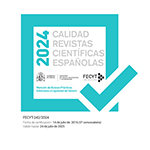Del desempleo como riesgo al desempleo como trampa: ¿Qué distribución de las responsabilidades plantea el paradigma de la activación propuesto por las instituciones europeas?
Abstract
The purpose of this contribution is to discuss the social and ethical principles underlying the new model of social intervention proposed by these bodies. To promote and place in circulation concepts that will fuel public debate is an approach to the achievement of supranational regulation increasingly favoured by the European institutions. Here, in relation to the specific case of activation, we will discuss both the differing ways in which the model is utilised and the effects entailed by its implementation, as well as how it affects the adjudication of responsibilities between the welfare state, workers and employers. A diagnosis of the problem will be proposed and explored, together with possible and legitimate alternatives for its resolution. The activation paradigm posits a transformation of the social and ethical underpinnings of the social contract, requiring us to take up a moral stance in relation to unemployment and social exclusion. It accordingly fosters a change in ideological and terminological presuppositions —in what is taken for granted— as a means of depoliticising the handling of the social conflicts likely to accompany current developments in changing production models, in order to prevent the socio-political nature of social exclusion from emerging. The point is to avoid all consideration of this issue, thereby forestalling any questions of power or oppression that might be raised.Downloads
Article download
License
In order to support the global exchange of knowledge, the journal Cuadernos de Relaciones Laborales is allowing unrestricted access to its content as from its publication in this electronic edition, and as such it is an open-access journal. The originals published in this journal are the property of the Complutense University of Madrid and any reproduction thereof in full or in part must cite the source. All content is distributed under a Creative Commons Attribution 4.0 use and distribution licence (CC BY 4.0). This circumstance must be expressly stated in these terms where necessary. You can view the summary and the complete legal text of the licence.










